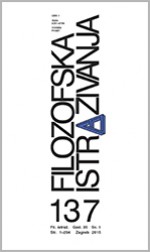Mediteranski toponimi u Nietzscheovim spisima
Mediterranean Toponyms in Nietzsche’s Works
Author(s): Vladimir JelkićSubject(s): Metaphysics, Ethics / Practical Philosophy, Aesthetics, Ancient Philosphy, 19th Century Philosophy, Sociology of Culture
Published by: Hrvatsko Filozofsko Društvo
Keywords: Friedrich Nietzsche; Athens; Rome; Mediterranean; Europe;
Summary/Abstract: The paper starts from Nietzsche’s stance that the cultural concept of Europe does not include the whole of Europe in the geographic sense, but only those nations and minorities which share the common past in ancient Greece, Rome, Judaism, and Christianity. Among numerous toponyms representing such a concept, all of which belong to the Mediterranean civilization and cultural circle, I have chosen Athens and Rome as subjects of my analysis. My goal is to show that in Europe which, according to Nietzsche, aspires to become united, those cities represent both the classical ideals Europe is trying to reach and the contradictions lying in its foundation. According to Nietzsche, there are two Athens’ and two Romes. The classical Athens is symbolized by Pericles, and its decline by Plato. Analogous to this, the classical Rome is symbolized by Julius Caesar, and its decadence by the apostle Paul as the founder of Christianity which destroyed the Imperium Romanum. The apostle Paul is, for Nietzsche, the embodiment of everything bad in Christianity and of those things which fatefully determined our civilization from the ancient times to modernism. Therefore, it is he, even more than Socrates, who started the decadence of the magnificent Greek culture and of all the virtues embodied in the Roman Empire, the enemy of wisdom and the fanatic priest equipped with ressentiment for all the values that elevate life. So, the decadence of modernism, for Nietzsche, begins with St. Paul. Although I have limited this paper to two cities and few historical figures, I believe that it is an appropriate way of comprehensive consideration of Nietzsche’s philosophical positioning of Mediterranean as the starting place of European history.
Journal: Filozofska istraživanja
- Issue Year: 35/2015
- Issue No: 01/137
- Page Range: 89-99
- Page Count: 11
- Language: Croatian

